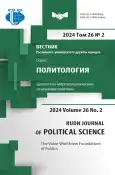Imagining the Russian Nation: Who, According to the Residents of Russia, Constitute Russian Society, and Can an Outsider Become its Member?
- Authors: Varshaver E.A.1,2,3, Ivanova N.S.1,2, Egorova T.D.2
-
Affiliations:
- Russian Presidential Academy of National Economy and Public Administration
- Group for Migration and Ethnicity Research
- Higher School of Economics University
- Issue: Vol 26, No 2 (2024): The Value-Worldview Foundations of Politics
- Pages: 306-324
- Section: POLITICAL IDENTITY AND IDENTITY POLICIES: SEMANTIC FOUNDATIONS AND IMPLEMENTATION TOOLS
- URL: https://journal-vniispk.ru/2313-1438/article/view/322433
- DOI: https://doi.org/10.22363/2313-1438-2024-26-2-306-324
- EDN: https://elibrary.ru/MYRGAC
- ID: 322433
Cite item
Abstract
This article presents the outcomes of a study that investigates the perceptions among residents of Russia regarding their membership in the Russian nation or society. The study employs interviews (100) and focus groups (40), carried out across five regions of Russia, as its primary data collection methods. The key methodological approach was to pose questions about societal membership and the integration of various migrant types into Russian society, thus revealing underlying beliefs about the criteria for belonging to the Russian nation or society. This approach was especially insightful for understanding perceptions about groups that are typically not questioned about their societal membership. The study identifies two distinct types of societal membership: “organic” and “acquired”. Organic membership is socially ascribed to individuals born in Russia or those with ancestors born in Russia. This category often overlaps with national identity, rendering ethnic Russians born in Russia the quintessential members of Russian society. However, organic membership is not exclusively reserved for ethnic Russians; it extends to other ethnic groups considered part of “the peoples of Russia”, though they are seen as less typical members. Interestingly, the perception of these membership categories varies between regions with distinct national identities and those without such distinctions. Acquired membership, on the other hand, is contingent upon fulfilling specific criteria, such as familiarity with Russian (or regional) culture and a desire to be part of Russian society. Exceptionally, notable achievements can override these criteria. Unlike organic members, individuals with acquired membership can lose their societal status, except in cases of betrayal, which is nearly impossible for organic members. The findings are contextualized within citizenship studies, positing that the described constructs serve as a foundation for the institution of citizenship rather than the converse. Additionally, the study contributes to the ongoing cognitive turn in ethnicity research, offering new insights into the conceptualization of national and societal belonging.
Keywords
About the authors
Evgeni A. Varshaver
Russian Presidential Academy of National Economy and Public Administration; Group for Migration and Ethnicity Research; Higher School of Economics University
Author for correspondence.
Email: varshavere@gmail.com
ORCID iD: 0000-0002-5901-8470
PhD in Sociology, Senior Research Fellow at the Centre for Regional Research and Urban Studies, Institute of Applied Economic Research, RANEPA, Head of Group for Migration and Ethnicity Research, Associate Professor at HSE University
Moscow, Russian FederationNataliya S. Ivanova
Russian Presidential Academy of National Economy and Public Administration; Group for Migration and Ethnicity Research
Email: nataliya.ivanova.0709@gmail.com
ORCID iD: 0000-0002-1140-2334
MA in Sociology, Research Fellow at the Centre for Regional Research and Urban Studies, Institute of Applied Economic Research, RANEPA, Lead Researcher at Group for Migration and Ethnicity Research
Moscow, Russian FederationTatiana D. Egorova
Group for Migration and Ethnicity Research
Email: egorovatatianad@gmail.com
ORCID iD: 0000-0003-0192-7062
MA in International Relations, Researcher at Group for Migration and Ethnicity Research
Moscow, Russian FederationReferences
- Anderson, B. (2008). Imagined communities: Reflections on the origin and spread of nationalism. london, new york: Verso.
- Barth, F. (1998). Ethnic groups and boundaries: The social organization of culture difference. Long Grove, IL: Waveland Press.
- Berger, P.L., & Luckmann, T. (1995). The social construction of reality. A treatise of sociology of knowledge. Moscow: Medium. (In Russian).
- Bourdieu, P. (2018). cultural reproduction and social reproduction. in Knowledge, Education, and Cultural Change (pp. 71–112). London, New York: Routledge. https://doi.org/10.4324/9781351018142
- Brubaker, R. (2006). Ethnicity without groups. Cambridge, MA: Harvard University Press. https://doi.org/10.2307/j.ctv1nnwhvg
- Brubaker, R., Loveman, M., & Stamatov, P. (2004). Ethnicity as cognition. Theory and Society, 33, 31–64. https://doi.org/10.1023/B:RYSO.0000021405.18890.63
- Chandra, K. (Ed.). (2012). Constructivist theories of ethnic politics. oxford, new york: oxford University Press. https://doi.org/10.1093/acprof:oso/9780199893157.001.0001
- Clarke, J., Coll, K., Dagnino, E., & Neveu, C. (2014). Imagining the ‘communities’ of citizenship. Disputing Citizenship (pp. 107–168). Bristol, Chicago: Policy Press. https://doi.org/doi.org/10.2307/j.ctt9qgzqg
- Drobizheva, L. (2020). Russian identity: Searching for definition and distribution dynamics. Sotsiologicheskie Issledovaniya, 8, 37–50. (In Russian). https://doi.org/10.31857/S013216250009460-9
- Gellner, e. (1991). Nations and nationalism. Moscow: Progress. (In Russian).
- Glenn, E. (2000). Citizenship and inequality: Historical and global perspectives. Social Problems, 47(1), 1–20. https://doi.org/doi.org/10.2307/3097149
- Hobsbawm, e., & Ranger, t., (eds.). (2012). The invention of tradition. cambridge, new york: cambridge University Press. https://doi.org/10.1017/CBO9781107295636
- Isin, E.F., & Turner, B.S. (2002). Citizenship studies: An introduction. Handbook of Citizenship Studies (pp. 1–10). London: Sage. https://doi.org/10.4135/9781848608276
- Magnette, P. (2005). Citizenship: The history of an idea. colchester: ecPR Press.
- Mead, G.H. (1934). Mind, self, and society from the standpoint of a social behaviorist. chicago: University of chicago Press.
- Smith, a.d. (1986). The ethnic origins of nations. oxford: Blackwell Publishing.
- tishkov, V. (2008). the Russian people and national identity. Russia in Global Affairs, 6(3), 135–142.
- Varshaver, e.a. (2023). integration of migrants through the lens of a constructivist approach to ethnicity. RUDN Journal of Political Science, 25(2), 377–396. (In Russian). https://doi.org/10.22363/2313-1438-2023-25-2-377-396
- Wimmer, A. (2013). Ethnic boundary making: Institutions, power, networks. oxford, new york: oxford University Press. https://doi.org/10.1093/acprof:oso/9780199927371.001.0001
- Wimmer, A., & Glick Schiller, N. (2002). Methodological nationalism and beyond: Nation– state building, migration and the social sciences. Global Networks, 2(4), 301–334. https://doi.org/10.1111/1471-0374.00043
Supplementary files









